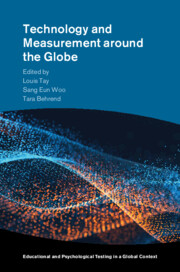Book contents
- Technology and Measurement around the Globe
- Educational and Psychological Testing in a Global Context
- Technology and Measurement around the Globe
- Copyright page
- Contents
- Contributors
- Introduction
- Part I Foundations
- Part II Global Perspectives on Key Methods/Topics
- Part III Regional Focus
- Chapter 7 Technology and Measurement in Asia
- Chapter 8 Technology-Enabled Measurement in Singapore
- Chapter 9 A European Perspective on Psychometric Measurement Technology
- Chapter 10 Testing and Measurement in North America with a Focus on Transformation
- Chapter 11 Technology and Measurement Challenges in Education and the Labor Market in South America
- Chapter 12 Reflections on Testing, Assessment, and the Future
- Index
- References
Chapter 9 - A European Perspective on Psychometric Measurement Technology
from Part III - Regional Focus
Published online by Cambridge University Press: 08 November 2023
- Technology and Measurement around the Globe
- Educational and Psychological Testing in a Global Context
- Technology and Measurement around the Globe
- Copyright page
- Contents
- Contributors
- Introduction
- Part I Foundations
- Part II Global Perspectives on Key Methods/Topics
- Part III Regional Focus
- Chapter 7 Technology and Measurement in Asia
- Chapter 8 Technology-Enabled Measurement in Singapore
- Chapter 9 A European Perspective on Psychometric Measurement Technology
- Chapter 10 Testing and Measurement in North America with a Focus on Transformation
- Chapter 11 Technology and Measurement Challenges in Education and the Labor Market in South America
- Chapter 12 Reflections on Testing, Assessment, and the Future
- Index
- References
Summary
The quality of psychological assessment processes in talent management is influenced by our choices about which measurement technologies to use. Technology with relevance to assessing talent is also advancing at great speed in many domains. These advances include processing power and speed, human computer interaction research, and machine learning and artificial intelligence. Given these rapid developments, it is an appropriate time to pause and take stock of how emerging assessment approaches (e.g., game-based assessment) that leverage these new developments are used, relative to more traditional approaches such as questionnaires and interviews. To achieve this objective, we report here on a survey of European assessment practitioners. We ask about the technology they use for psychological assessment, the constructs they measure with those approaches, and the levels of organisations they are used at. We also asked about how traditional approaches are being enhanced with technology and about practitioner perceptions of the reliability, validity and adverse impact and privacy of their technological choices.
- Type
- Chapter
- Information
- Technology and Measurement around the Globe , pp. 271 - 307Publisher: Cambridge University PressPrint publication year: 2023

